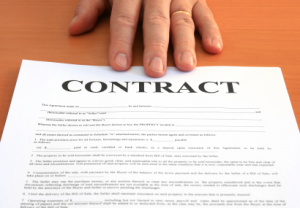 QUESTION: We have been trying to sell our home privately for some time now. Although we have had a few buyers look through, we have not had any serious offers until now. The buyers, however, are having a hard time getting the financing they need and have asked if we would help finance their purchase of our home. Could you give us your thoughts on us lending money to would-be Buyers of our home?
QUESTION: We have been trying to sell our home privately for some time now. Although we have had a few buyers look through, we have not had any serious offers until now. The buyers, however, are having a hard time getting the financing they need and have asked if we would help finance their purchase of our home. Could you give us your thoughts on us lending money to would-be Buyers of our home?
ANSWER: Lending money to your potential Buyers is of course a risk. Beside the obvious fact that you do not know the Buyers well, you should first ask yourself why a lending institution (“bank”) will not finance them for the entire purchase, or worse, will not finance them at all?
Having said that, it is not an uncommon event for a Seller to lend some or all of the money needed to purchase his/her home. This is referred to as a Vendor Take-Back Mortgage. Simply, a Seller lends the necessary amount of money and then places a mortgage on title for that amount.
Depending on the particular situation, the Seller’s mortgage will either be a first mortgage (in the situation where a bank or another lender is not involved), or, a second mortgage (in the situation where there is a bank or another lender involved). A lending Seller’s rights are affected dramatically depending on whether he/she has a first, or, a second, mortgage on title. Legal advice is very important here.
Assuming you wish to lend money to the potential Buyers, below are three factors, amongst others, to consider:
1) Traditional Lender: Why are the Buyers not successful in getting any or all of the financing from a bank? There are a host of possible reasons such as bad credit history, low incomes, not having enough money for a down-payment, just graduated from law school and has not demonstrated a steady income stream and so on.
The reason the Buyers were declined for financing should be a major factor to consider before making your decision to lend money. I would suggest requesting your Buyers provide a written explanation from the banks they have approached delineating why their application for a mortgage was declined. Lenders are more than ready to provide a written explanation.
2) Credit History: Since you probably will not know the Buyers well, it is important to conduct a credit history check. This will provide a picture of the Buyers past behaviour with respect to debts — do they have a history of late or missed payments, and so on.
The credit report will also be useful by allowing you to confirm if the Buyers have provided you with a complete and full list of their present debt situation. If they have disclosed all of their debts to you, then you should not find any new debts in the credit report. If, however, you find in the credit report a host of undisclosed debts, red lights should come on.
3) Verification: A third important detail is verification of information provided by the Buyers. This entails, amongst other things, verifying the employment record of the Buyers — how long have they worked for one employer? What is their present income? All this information should be provided to you by the employer on the employer’s letterhead. Request copies of the Buyers tax assessment for the past three years to further confirm their incomes.
This verification process will not only serve to confirm the representations made to you by the Buyers, but will also provide insight as to how honest and up-front the Buyers have been about their financial situation.
Finally, lending money to potential Buyers is extremely risky. At the very least, make sure you have legal assistance to protect your interest. In fact, I do not recommend doing this at all without legal advice and assistance. We are dealing with a lot of money and this should not be the time to take unnecessary chances.
 On a side note, in your particular case, I note you have been attempting to sell your home privately. You may want to consider listing your home with a licensed Realtor. By doing so, you will be exposing your home to a much broader market, which could translate into your finding a Buyer who does not require you to finance the transaction, in turn saving you the aggravation and risk of lending and collecting money. You would simply sell the home and move on. Best of Luck!
On a side note, in your particular case, I note you have been attempting to sell your home privately. You may want to consider listing your home with a licensed Realtor. By doing so, you will be exposing your home to a much broader market, which could translate into your finding a Buyer who does not require you to finance the transaction, in turn saving you the aggravation and risk of lending and collecting money. You would simply sell the home and move on. Best of Luck!
This guest post was written by Victor Hussein. Victor is a Real Estate Lawyer In KW and Cambridge, 519-744-8585.
Photo source




